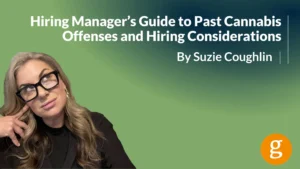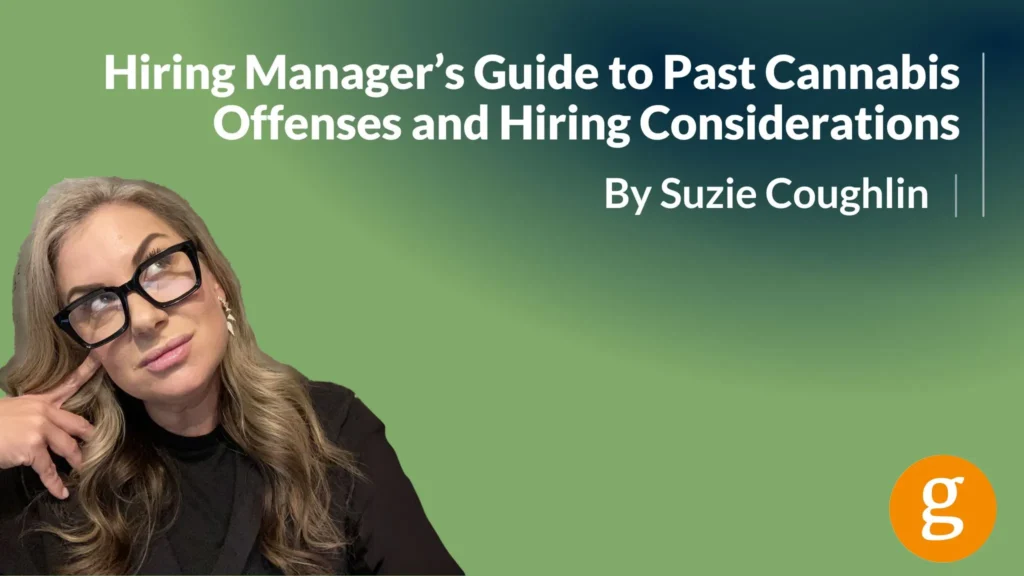Hiring Manager’s Guide to Past Cannabis Offenses and Hiring Considerations

National Cannabis Awareness Month is observed in April each year to promote education, advocacy, and general awareness around cannabis and its evolving legal status. The month is also a good time to raise awareness about cannabis-related hiring policies and fighting ongoing stigma.
In the talent recruiting space, specifically, it’s an opportunity to educate others about the impact of evolving cannabis laws on hiring decisions – and on job candidates. This article explores the status of expanding state laws, as well as considerations and recommendations for today’s hiring managers.
The job applicant’s point of view
With frequent changes in cannabis laws across many U.S. states, talented and highly accomplished job candidates are increasingly finding themselves in situations where offenses that were once criminalized are now decriminalized. They’re wondering how these regulatory changes may impact their current and future chances of landing a new job.
Here are a few examples:
- Possession of Small Amounts: In many states, possessing small amounts of cannabis for personal use used to be a criminal offense that could lead to jail time. Now, however, this has been decriminalized in many states, meaning offenders may only face a fine or no penalty at all.
- Medical Cannabis Use: Patients who use cannabis for medical conditions were once prosecuted, even when they had a legitimate medical need. Now, many states allow for the use of medical cannabis with a doctor’s recommendation, making it legal for patients to access cannabis for treatment.
- Recreational Use and Home Cultivation: In states like California, Colorado, and many others, recreational cannabis use and growing a small number of plants at home were once serious crimes but are now legal under regulated frameworks.
What hiring managers need to know: Laws are changing at a rapid pace across the United States
As of 2020, 11 states had legalized recreational cannabis and several others had decriminalized it. Today, there are 24 states, plus three territories and the District of Columbia. Additionally, medical cannabis programs, which began in 1996 in California, have exploded to 39 states and other jurisdictions.
Where do state laws stand today?
On March 6, 2025, the National Conference of State Legislatures (NCSL) published updated statistics on the latest cannabis state laws. This bipartisan nongovernmental organization serves state legislators and legislative staff across all 50 U.S. states, commonwealths, territories, and the District of Columbia.
- Medical-Use Update: As of February 1, 2025, 39 states, three territories, and the District of Columbia allow the medical use of cannabis products.
- Non-Medical-Use/Adult-Use Update: Twenty-four states, three territories, and the District of Columbia allow or regulate cannabis for non-medical adult (recreational) use, also as of February 1, 2025.
- Low-THC Update: Nine states allow the use of “low THC, high cannabidiol” products for medical reasons in limited situations or as a legal defense. Such products contain a low percentage of THC, the main psychoactive component of cannabis. These products offer patients the benefits of cannabis without the strong psychoactive effects of high-THC products.
These fast-expanding state laws and programs create an opportunity for hiring managers to better understand how cannabis offenses in years past may no longer hold the same significance or hiring barriers today, including in drug-free workplaces.
Advice for hiring managers in considering past cannabis offenses
In short, during the hiring process, don’t be quick to discount or dismiss job candidates who may have past offenses as cannabis users. Of course, this depends on the nature of the job and your company’s policies, but in general, a past cannabis offense that is no longer criminalized should not be a major hiring barrier – especially if it will not impact the job candidate’s ability to perform the job.
Here are a few things to consider:
- Relevance to the Role: If the past offense has no bearing on the job (for example, a non-violent possession charge from years ago), it likely shouldn’t be a concern.
- Legal Protections: Some states have ban the box laws that prohibit employers from asking job candidates about their criminal history in the initial stages of the application process, and some prohibit employers from considering past offenses that may be revealed in background checks, criminal convictions, or criminal records, but are no longer criminal and irrelevant to the job.
- Character and Growth: If the candidate is otherwise qualified and has shown responsibility and professionalism, their past should not overshadow their present qualifications.
Unless the cannabis offense is directly related to safety or legal compliance in the workplace, it’s worth evaluating the job applicant based on their skills, experience, and potential, rather than on past legal circumstances that do not apply today.
Consult with an informed talent recruiting firm
At Goodwin Recruiting, we firmly believe that Second Chance Hiring is good for business. We help hiring managers find and onboard top-tier talent for middle management to executive-level roles across multiple industries, including the fast-growing cannabis industry, which requires high-level expertise in today’s rapidly changing state laws and regulatory environments.
Contact me at any time for current insights into hiring processes surrounding cannabis state laws, local laws, ongoing legalization, and related background checks – or for assistance in finding the right talent for your organization. I am a senior recruiting partner with Goodwin Recruiting and welcome the opportunity to help you meet your hiring goals.
Share This Article






































